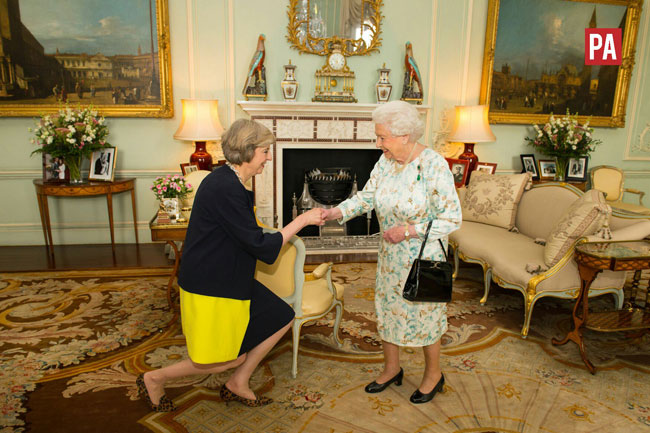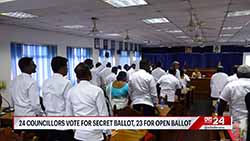Theresa May becomes Britainís PM as David Cameron resigns
July 13, 2016 10:22 pm
Theresa May has emerged from Buckingham Palace as Britain’s second female prime minister, after paying the traditional visit to the Queen to be invited to form a government.
May’s appointment at the palace, to “kiss hands” with the Queen, as the ceremony is known, came shortly after David Cameron went to Buckingham Palace to tender his resignation.
Cameron, who stepped down after the electorate rejected his pleas to vote to remain in the European Union in last month’s referendum, had earlier congratulated May as he left 10 Downing Street for the last time with his wife and children.
May swept to her party’s leadership, when her final opponent, the pro-Brexit Andrea Leadsom, dropped out this week after making controversial comments about motherhood. May had served Cameron as home secretary throughout his six years in government.
The new prime minister was expected to make the first senior appointments to her government on Wednesday evening, including a minister for Brexit.
David Cameron addressed his people for the last time as Britain’s prime minister on Wednesday afternoon, before leaving for Buckingham Palace to tender his resignation to Queen Elizabeth II and hand over power to his successor, Theresa May, the home secretary.
“It has been the greatest honor of my life to serve our country as prime minister over these last six years, and to serve as the leader of my party for almost 11 years,” Mr. Cameron said outside 10 Downing Street in London, joined by his wife, Samantha, and their three children. “My only wish is continued success for this great country that I love so very much.”
Mr. Cameron cited the nation’s economic recovery as his top legacy. “With the deficit cut by two-thirds, two and a half million more people in work, and one million more businesses, there can be no doubt that our economy is immeasurably stronger,” he said.
He also cited among his accomplishments the legalization of same-sex marriage, in 2013; changes to the education system; and reduced wait times for operations in Britain’s much loved National Health Service.
“I’m delighted that for the second time in British history, the new prime minister will be a woman, and once again a Conservative,” Mr. Cameron said. “I believe Theresa will provide strong and stable leadership in fulfilling the Conservative manifesto on which we were elected, and I wish her well in negotiating the best possible terms for Britain’s exit from the European Union.”
Mr. Cameron and his family set off for the palace at 4:48 p.m. and arrived only five minutes later. The palace confirmed the resignation less than a half-hour later, and Ms. May, 59, immediately left for the palace to meet the monarch. She will be the 13th prime minister to serve the queen; the first was Winston Churchill.
Hours earlier, in his final parliamentary duty, Mr. Cameron took part for the last time in prime minister’s questions, the weekly ritual in which lawmakers interrogate the leader in often combative exchanges.
On Wednesday, the discussion was more respectful — and lighthearted — than usual, as Mr. Cameron’s political adversaries and allies paid tribute to him as he prepared to leave his office in 10 Downing Street for the last time as prime minister, a position he has held for six years.
“I’m told that there are lots of leadership roles out there at the moment: There’s the England football team, there’s ‘Top Gear,’ there’s even across the big pond the role that needs filling,” Danny Kinahan, a lawmaker from Northern Ireland, told Mr. Cameron jokingly, referring to the country’s soccer team, a popular television show and the United States presidential election.
Jeremy Corbyn, the embattled leader of the opposition Labour Party, congratulated Mr. Cameron for his support for same-sex marriage and for his efforts to secure the release of Shaker Aamer, a Saudi citizen and British resident, from Guantánamo Bay last fall. He pressed Mr. Cameron, however, on his record on homelessness; the affordability of housing; and the rise of “zero hour” contracts that can exploit low-wage workers.
Mr. Cameron said his government had reduced child poverty and cracked down on mistreatment of workers.
Ahead of his parliamentary appearance, Mr. Cameron told The Telegraph newspaper, “As I leave today, I hope that people will see a stronger country, a thriving economy and more chances to get on in life.”
Though Mr. Cameron won a general election only last year, he finds himself out of power at age 49. Mr. Cameron will be the youngest prime minister to relinquish the job since Archibald Primrose, the Earl of Rosebery, in 1895.
Before leaving Parliament on Wednesday, to laughter and applause, Mr. Cameron appeared to reflect on the transience of power, telling lawmakers: “I was the future once.”
More than a decade ago, when his party was in opposition, he had notably taunted the Labour prime minister, Tony Blair, telling him that Mr. Blair had been the future once.
Mr. Cameron will mainly be remembered as the prime minister who gambled — and lost — by holding a referendum in which he called on Britons to continue more than four decades of European integration.
When 52 percent of voters decided they wanted to leave the bloc in last month’s referendum, Mr. Cameron was left with little alternative but to resign.
After that appointment, Ms. May is scheduled to arrive at Downing Street, where she is likely to make a brief statement before beginning work on constructing her government. The new government’s main task will the highly complex one of withdrawing Britain from the 28-nation European Union.
Ms. May, who has served as home secretary for six years, is expected to promote several women to central positions in her cabinet, though it remains unclear whether those will include the jobs of chancellor of the Exchequer or foreign secretary.
Because she argued for Britain to remain inside the European Union, she is expected to give powerful positions to several of those who took the opposing view, to create a politically balanced cabinet.
One of her most delicate decisions will be what positions — if any — to offer figures such as Boris Johnson, the former London mayor, and Michael Gove, the justice secretary. Both men took leading roles in the campaign for withdrawal from the European Union, or “Brexit.”
The two men, in their final joust at Westminster, tangled over the respective challenges their leadership has faced. Mr. Cameron announced his resignation in the aftermath of Britain’s tumultuous referendum on June 23 to leave the European Union, while Mr. Corbyn, only 10 months into his term as the head of Labour, faces a challenge to that leadership.
Mr. Cameron said his governing Conservative Party had swiftly picked his successor, while saying of the opposition party, “They haven’t even decided what the rules are yet.”
Source: The New York Times
-Agencies












